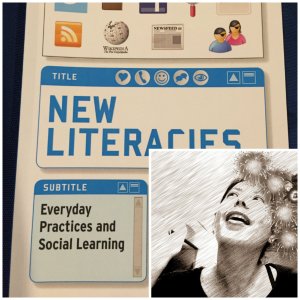The proliferation of collaborative practices is having an important impact in educational and working environments. The chapter focuses in exploring blogs and wikis as participatory and collaborative literacy practices.
I found interesting the evolution of blogging practices which are increasing due to the accessibility of easy-to-use publishing tools and hosting services. In terms of encouraging students’ participation and engaging in these types of blogging practices I think it is very important Technorati’s 2010 survey findings about the impact of mobile devices and shorter posts encouraging participation and providing dynamism to the exchange communication. We certainly can relate to our ds106 experience where microblogging and short posts are proving to be meaningful and engaging for our community. As Lankshear and Knobel mentioned, blogs are a flexible medium and a result of practices that are constantly evolving.
One idea that resonated with me was when the authors pointed out the little research focused on the readers’ impact despite the interactive nature of blog as a medium. In my opinion this is an important variable due to all the different interactions and activities occurring when developing a blog, and even more relevant when writing and reading multiblogger blogs. In massive collaborative experiences both participants and participation implies interactions and actions were readers and writers interact in a complex level of active contribution.
Lankshear and Knobel referred to the potential that wikis have in education to promoting massive collaborative educational projects. They mentioned that “wikis are widely identified as collaborative software” (p. 161) I found very enlightening the explanation of Wikipedia as participatory culture space were the community of authors play different roles and get involved in the creation process as a community-system where the interactions are addressed as a system perspective. This is an advance level of participation and I personally think it will be a great addition to include more serious practices in pedagogical practices. The experience of Bruckman (2005) to progressively transforming participation in collaborative projects can be an inspirational start point for other educational projects to understand and interact actively in collaborative projects.
In terms of collaboration work I experienced as a student and as a teacher the difficulties to work collaboratively. In most of the experiences I remember the teams divided work into specific tasks and then everyone worked individually and added their contributions to a whole, but the real collaborative work was absent. the final result was a compilation of individual ideas and tasks but not a group perspective product. To provide training and opportunities to exchange ideas, modify a common work, and create a team voice is in my opinion very important. In an interesting cross-cultural research O’Brien, Alfano, and Magnusson (2007) found that using digital technologies increase intercultural competencies. They concluded that using communication technologies improve social relations and can positively influence human attitudes and behaviors.
“Our project discovered that when students and teachers learn best practices for using information and communication technologies, they gain knowledge not simply in modes for digital discourse but the development of tools to build relationships, cross-culturally situated knowledge, and new media writing products that in turn advance research and learning in the field.” (O’Brien, Alfano, and Magnusson, 2007 )
Blogs, Wikis, and collaborative literacy practices provided important opportunities to engage students in one of the most complex educational goals: working collaboratively. Knowledge building in participatory cultures requires developing a sense of group work, and identify as an active part of a system where each member contribution is important and is building a whole perspective. That is very difficult and requires practice, flexibility and responsibility but the benefits are priceless.References
- Lankshear, C. & Knobel, M. (2011). New Literacies: Everyday Practices and Social Learning. New York: Open University Press.
- O’Brian, A., Alfano, C., Magnusson, E. (2007) Improving cross-cultural communication through collaborative technologies [Online]

Leave a reply to Week 5 Reflection: Hunker Down | susannahsimmons Cancel reply